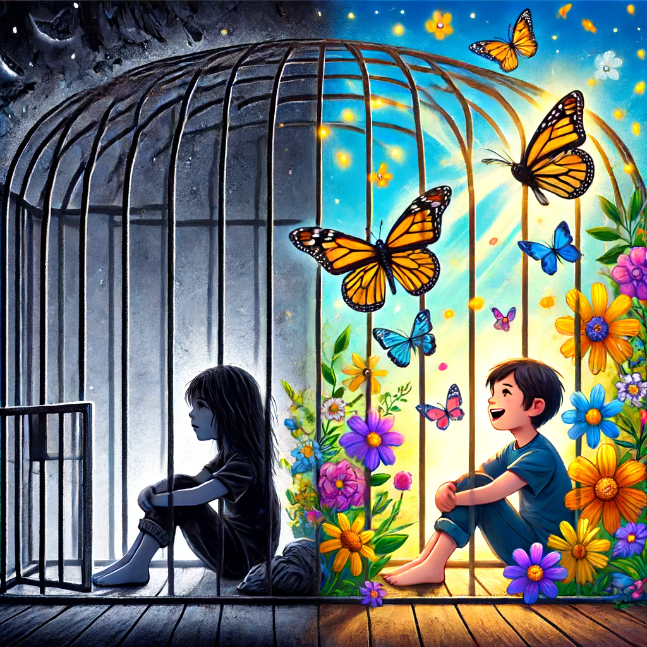The Impact of Depression, Poverty, Relationship Failure, and Childhood Trauma on Authors

The journey of an author is often romanticized, with images of creativity, inspiration, and literary success. However, many authors grapple with significant personal challenges such as depression, poverty, relationship failures, and childhood trauma. These struggles not only shape their personal lives but also profoundly influence their literary works. This article explores how these adversities have impacted various renowned authors, offering insights into how their experiences have shaped their writing and resonated with readers worldwide.
Depression: The Shadow Behind Creativity
Depression is a pervasive issue among authors, serving as both a source of creative fuel and a debilitating barrier. Notable authors like Sylvia Plath, Virginia Woolf, and J.K. Rowling have openly discussed their battles with depression.
Sylvia Plath: Known for her confessional style of writing, Plath's work, including her novel The Bell Jar, is deeply influenced by her experiences with depression. Her writing vividly portrays the struggles of mental illness, offering readers a raw and unfiltered look into her psyche.
Virginia Woolf: Woolf's works, including Mrs. Dalloway and To the Lighthouse, reflect her profound struggles with depression and bipolar disorder. Her stream-of-consciousness technique allows readers to delve into the complexities of her characters' inner lives, mirroring her own battles.
J.K. Rowling: Before achieving fame with the Harry Potter series, Rowling faced severe depression, particularly after the death of her mother and a tumultuous marriage. Her depiction of the Dementors in the Harry Potter series is a metaphor for her experiences with depression, resonating with many readers who have faced similar struggles.
Poverty: The Struggle for Stability
Poverty has been a significant hurdle for many authors, limiting their access to resources and opportunities. However, it also instills resilience and a unique perspective on life.
Charles Dickens: Dickens' early life in poverty profoundly influenced his works. His experiences working in a blacking factory and his father's imprisonment for debt are reflected in novels like Oliver Twist and David Copperfield, where he vividly depicts the harsh realities of poverty and social injustice.
George Orwell: Orwell's experiences of poverty and homelessness are poignantly captured in his works Down and Out in Paris and London and The Road to Wigan Pier. These narratives offer a stark portrayal of the socio-economic challenges faced by the underprivileged.
J.K. Rowling: Before her literary success, Rowling faced financial struggles as a single mother. Her journey from living on welfare to becoming one of the world's most successful authors is a testament to resilience and determination. Her story inspires many aspiring writers facing similar economic challenges.
Relationship Failure: Heartbreak and Healing
Relationship failures, including breakups and familial conflicts, are common sources of emotional pain for authors. These experiences often become powerful catalysts for creativity.
F. Scott Fitzgerald: Fitzgerald's tumultuous relationship with Zelda Sayre heavily influenced his writing. His novel Tender Is the Night explores themes of love, jealousy, and mental illness, reflecting his struggles with his wife's mental health and their turbulent marriage.
Elizabeth Gilbert: Known for her memoir Eat, Pray, Love, Gilbert's work was born out of the heartbreak of her divorce. Her journey of self-discovery and healing resonated with millions of readers, highlighting how personal pain can lead to profound creative expression.
Paulo Coelho: Coelho's experiences with relationship failures have deeply influenced his writing. His exploration of love, loss, and redemption in books like The Alchemist offers wisdom and solace to readers navigating their own relational challenges.
Childhood Trauma: The Lingering Echoes
Childhood trauma can leave indelible marks on an individual's psyche, profoundly affecting their worldview and creative expression.
Maya Angelou: Angelou's traumatic childhood, marked by sexual abuse and subsequent muteness, is poignantly captured in her memoir I Know Why the Caged Bird Sings. Her works reflect her resilience and ability to overcome immense personal adversity.
James Baldwin: Baldwin's tumultuous childhood, including experiences of racial discrimination and family strife, profoundly influenced his works. His novels and essays, such as Go Tell It on the Mountain and The Fire Next Time, explore themes of identity, race, and personal trauma.
Stephen King: King’s difficult childhood, marked by poverty and familial instability, has influenced many of his works. His ability to weave personal trauma into his horror stories, such as Carrie and The Shining, allows readers to confront their own fears through his characters' experiences.
Depression, poverty, relationship failures, and childhood trauma are formidable challenges that many authors have confronted. These experiences, while painful, can also serve as profound sources of inspiration and creativity. Authors like Sylvia Plath, Virginia Woolf, J.K. Rowling, Charles Dickens, George Orwell, F. Scott Fitzgerald, Elizabeth Gilbert, Paulo Coelho, Maya Angelou, James Baldwin, and Stephen King have transformed their personal adversities into powerful narratives that resonate with readers worldwide.
Their stories remind us that while authors may face significant challenges, these very struggles can become the wellspring of their greatest works. In the world of literature, every challenge can be a stepping stone to greatness, and every setback a prelude to an extraordinary story.



